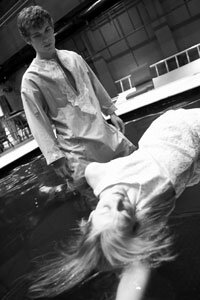SHELF LIFE- Morphing: Classical lit into modern theater
There's something unsettling about wearing wet clothes, especially in public places. Audiences at Mary Zimmerman's adaptation of Ovid's Metamorphoses at Live Arts looked on with nervous anticipation.
The play, directed by Stephen Levine, makes ample use of water, stimulating the senses while challenging our tolerance for the unexpected. The production features a large pool center stage and a cast of 12 whose movement in and out of the water makes for an unsettling and/or amusing evening. Those sitting in the front row are provided a towel to counter wayward splashes– but it's really only a towelette.
A little discomfort, as Zimmerman and Levine know, can be a good thing. Beyond its thematic significance, the pool serves as a medium through which the players can engage a passive audience and access and affect certain human biases.
The original Metamorphoses, a poem in 15 books by the Roman poet Ovid around the beginning of the Common Era, is more than a collection of Greek and Roman myths. A chronological account of the cosmos from creation to his own day, the poem also incorporates myths and legends about supernatural transformations, and was controversial in its time for challenging the accepted order by elevating human passion at the expense of godlike abstention. While it's sometimes called a "mock-epic," and canonized with other epic poems of antiquity (the Iliad, the Odyssey), Ezra Pound called the translation of Metamorphoses "the most beautiful book in the English language."
Like Ovid, Zimmerman sees thematic fluidity in the variety of emotional experiences in the ancient myths. She has adapted a number of Ovid's stories into a series of highly stylized dramatic vignettes, including Vertumnus's comic courtship of Pomona (Eamon Hyland and Shawnna Pledger) and the ill-fated marriage of Euridyce and Orpheus (Sara Eshleman and Mitch Roessing) and their tortuous journey through the underworld.
The recurring themes are love and, to a degree, love's baser counterpart, lust. Central to the treatment of both is the inevitabilty of change.
Rather than a mere dramatization of the Metamorphoses, Zimmerman's adaptation has an added ethical dimension– she employs the stage as a catalyst for self-reflection and positive change. That intention is most evident in the play's Prologue and Epilogue, and in certain gaps between the vignettes when the playwright's voice: bleeds through: "It remains important and salutary to speak... of enigmatic things; the irrational and ambiguous" in other words, about things that unsettle us.
The use of water facilitates that plan, distancing the audience from the terra firma of habit and expectation.
Metamorphoses opens with a mood-setting prologue that gives the poem's first book about the creation of the world succinct dramatic treatment. A preliminary convocation of the players is also executed, to stunning visual effect. The youngest cast member, Beatrice Anderson, wades alone into the pool and, lying on her back in the spotlight, utters the first line, "Bodies, I have in mind, and how they can change to assume new shapes."
Among the more exotic adaptations is the treatment of the myth of Phaeton and Apollo, to which is added a modern twist: Phaeton (Geoffrey Culbertson) is a haughty prep school boy with an inferiority complex, and Apollo's (William Brown) chariot is now a sports car. In a comic re-appropriation of the pool as swimming pool, Phaeton lounges in a bright blue floating chair and recounts with an air of mock authority how his little tantrum ends, incidentally, with the incineration of the world.
The most striking element of the story is the presence of the Therapist (Stefanie McCormack), who orbits Phaeton offering a play-by-play analysis of his psychological complex. The eerie anachronistic presence of a shrink confirms the relevance of ancient myth to modern experience while also highlighting the disconnect between modern science and that earlier, more rudimentary, form of self-inquiry: mythmaking.
Certain stories and themes are a continual source of artistic inspiration, and Metamorphoses affirms that the classics are always open to interpretation. Zimmerman's provocative adaptation and the bold artistic execution by Levine and the cast and crew encourage the audience to adopt the adventurous spirit advocated by the speaker in the Prologue: "Change me, and let me glimpse the secret."

Water is the medium of change in Live Arts' latest production.
PHOTO COURTESY LIVE ARTS
#